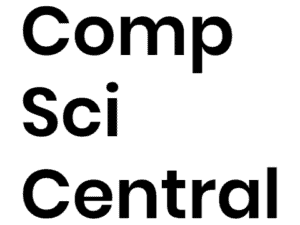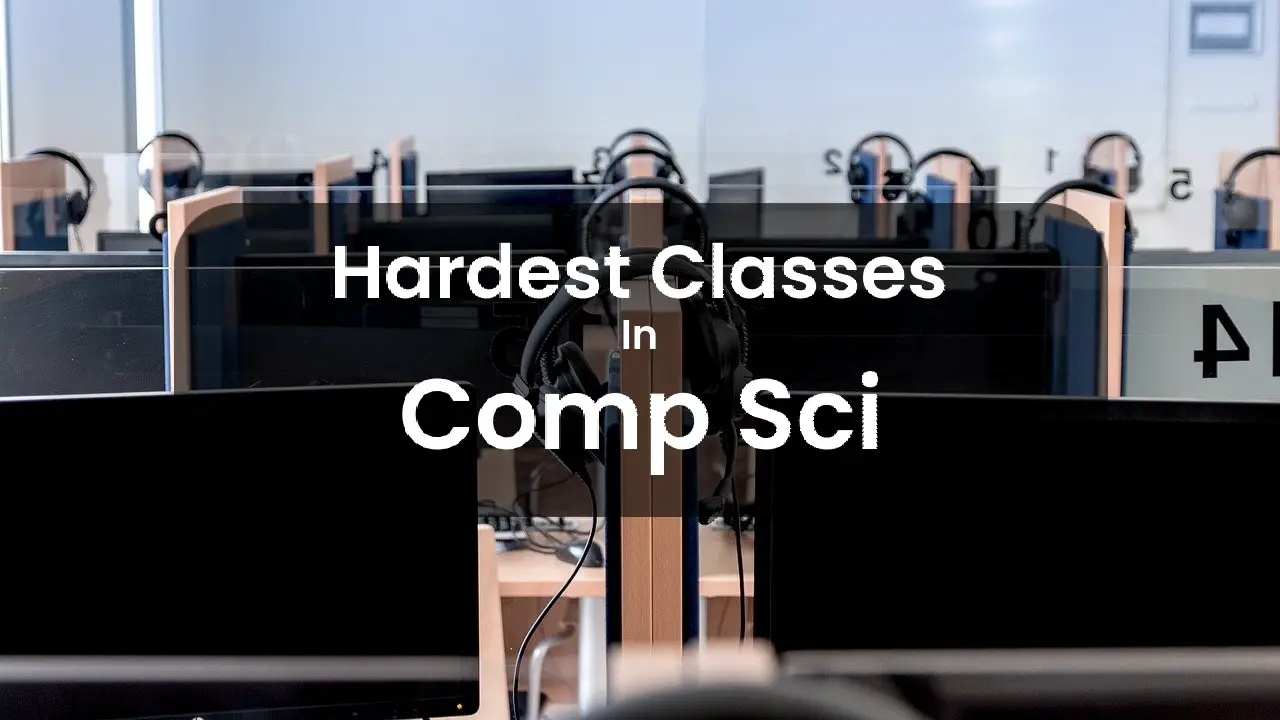Computer Science is known for being one of the hardest majors. There’s usually a lot of math and some of the programming concepts can be incredibly difficult. However, there are some classes that stand out as being the most difficult. That’s what we’re talking about today. These are the hardest Computer Science classes that you’ll face during your undergrad.
Hardest Computer Science Classes
1. Data Structures and Algorithms
2. Discrete Mathematics
3. Operating Systems
4. Automata Theory
5. Calculus
These are the 5 hardest computer science classes that you’ll take during your undergraduate (in no particular order). Technically, Calculus isn’t a Comp Sci class. However, it is required for most C.S. programs. Depending on your University, you might not need to take all of these classes. Of this list, I’ve completed my Calculus requirements, as well as my Data Structures and Algorithm requirements. Let’s go over each class description and talk about why they’re deemed as the hardest.
1. Data Structures and Algorithms
My Experience
I just took Data Structures and Algorithms last semester (Spring 2020) and it was definitely hard. The homework was manageable because I was given a week to complete each assignment. I ended up getting a ‘C’ on the midterm but pulling through on the final, ending the class with an ‘A.’ However, it was certainly the most challenging class for the semester.

Class Description
I took this class after I transferred to Governors State University. It was basically a continuation of the Intro to Java class that I took while I was still at Purdue Northwest University. The Intro Java class used the first half of the book, Building Java Programs (4th Ed.). Additionally, the Data Structure and Algorithm class used the second half of that text. Here’s the class description:
Introduces data structures and algorithms for problem-solving in Computer Science. Major topics Include linked list, stack, queue, trees, graphs, algorithms, sorting, priority queues, hashing tables of data structures, and sorting, searching, string processing, graph, and mathematical algorithms. Emphasize Issues of complexity, efficiency, and reliability of algorithms.
Tips For Success
Data Structures and Algorithms is a hard class, but it’s far from impossible to find success. Having a firm grasp on programming fundamentals will help a lot. This isn’t an introductory topic so if you’re slacking on the basics, there’s a good chance you’ll fail. Also, having an interest in the subject matter will further help. These assignments take time so if you don’t find the course interesting, it will be hard to put in those hours.
2. Discrete Mathematics
Teacher Experience
I haven’t taken this class yet, but it is required for my degree so I will eventually. So instead of my own experience, I’ll share the experience of another. Gary Page received his master’s degree in Computer Science from John Hopkins University and now teaches Discrete Math. He had this to say regarding the difficulties of Discrete Mathematics.
My experience in teaching discrete math is that (at least at the level of a first course) the difficulty is almost entirely in unfamiliarity. Boolean algebra is perhaps an extreme example. At its heart, it is integer math with only 0 and 1, with only one change to the rules (1+1=1 instead of 2, since there is no 2).
Class Description
Even though this is one of the hardest Computer Science classes, I’m actually really looking forward to taking it. I anticipate it being more fun than challenging. I also believe it will make me a much better developer so I’m looking forward to that too. Here’s the course description at my University:
Introduces the analysis of finite collections and mathematical foundations of sequential machines, computer system design, data structures, and algorithms. Includes sets, counting, recursion, graph theory, trees, nets, Boolean algebra, automata, and formal grammars and languages.
Tips For Success
I haven’t taken this class yet so I can’t speak from experience. However, I know that a good mathematical foundation will help. Also, as Gary said, the difficulty comes from unfamiliarity on the subjects within Discrete Math. Familiarizing yourself with the contents of your course matter should help immensely here.
The last tip: I’ve heard that the topics covered in Discrete Math can range greatly from school to school. Therefore, if you decide to brush up before taking this class, make sure you check what will be required at your University.
3. Operating Systems
Student Experience
This class isn’t required for my degree program, but it’s one of the hardest Computer Science classes so I had to include it. Since I can’t speak from my experience here, I’ll share that of another C.S. student. Arvin Chang graduated with a Computer Science degree from Harvard. He said this regarding Operating Systems courses:
Operating Systems courses are difficult because typically you end up writing most of the operating system yourself. An operating system has a lot of modules involved like shell, fork, file system, and virtual memory and that’s a LOT of code to be written (I know one of my assignments had 92 pages of code).
Often you will be writing the current week’s assignment using the code from last week’s assignment (which itself is built on top of the assignment from two weeks ago). So if your old code has a bug, you have to fix that BEFORE you can work on your current assignment.
Class Description
In order to be consistent with Arvin’s experience, I thought it would be appropriate to use Harvard’s class description. The description is as follows:
This is an in-depth course in operating systems design and implementation, focusing on multicore operating systems kernels. Operating systems are some of the most complex software artifacts that exist. Kernels abstract the features provided by computer hardware, making those features safer and more convenient to use. This means that OS designers have to understand how hardware works (at least at the level of specifications) and how software works. OS programmers also must become comfortable with navigating in, and contributing to, code bases too large to wholly understand. Most of us can pick up this important skill.
Tips For Success
If we take what Arvin said into account, we gather a couple things. For one, there is a lot of programming involved, so be prepared for that. Second, since each assignment builds from the last, it’s crucial to make sure each module is bug-free before moving onto the next.
4. Automata Theory
Teacher Experience
This is another class that I haven’t personally taken, so I’ll draw on another’s experience. Tim Farage is a Computer Science professor at the University of Texas in Dallas and teaches Automata Theory. He said this regarding the usefulness of Automata Theory:
The most useful part of Automata Theory is when it covers Finite State Machines. These are used in many areas of computer science such as in the Internet’s TCP/IP protocol. It is also used when searching a document for a word or phrase. The rest of Automata Theory is interesting and helps you think about which math models can solve various problems.
When I was applying for a job at Inet Technologies, they gave me a coding test. About 1/3rd of it was about finite state machines. I was the only one to ever get 100% on their exam.
Class Description
The University I attend doesn’t offer Automata Theory at the undergraduate level, but the University of Texas at Dallas does. The course description is as follows:
Automata Theory (3 semester credit hours) A review of the abstract notions encountered in machine computation. Deterministic and nondeterministic finite automata; regular expressions, regular sets, context-free grammars, pushdown automata, context-free languages. Selected topics from Turing Machines and undecidability.
Tips For Success
Practice makes perfect. I’ve heard that this is another on of those classes, similar to Calculus, that requires a lot of practice to excel. If you must take this class, make it interesting if the interest doesn’t come natural. There’s a lot of benefits to understanding these concepts well.
5. Calculus
Student Experience
Calculus was the hardest Computer Science class I’ve taken so far. To be more specific, it was Calculus 2 (integral Calculus) which really gave me a tough time. Again, although it’s not actually a Comp Sci class, it is required for my degree.
When I first started community college, my math level was pretty low. I had to take intermediate algebra, college-level algebra, and pre-calculus before I could finally take Calculus 1. Pre-calculus covered a lot of trigonometries that proved to be essential in Calculus 1 and Calculus 2. Algebra also proved to be just as essential.
Class Description
Here’s the class description from Governors State University:
Emphasizes applications of basic calculus concepts. Topics include limits; techniques of differentiation applied to polynomial, rational, exponential, and logarithmic functions; partial derivatives and applications; maxima and minima; elementary techniques of integration including substitution and integration by parts. This course is designed specifically for students in business and the social sciences and does not count toward a mathematics degree.
Tips For Success
I really have three main three tips to help you succeed at Calculus. If you want more tips, check out my articles on the 5 steps to pass Calculus and the best resources to learn Calculus. The three tips are:
- Make sure you know algebra and trigonometry inside and out.
- Practice Calculus problems until it becomes second nature.
- Learn to love it. Passion will drive you forward.
Final Thoughts
Computer Science can definitely be hard, especially in these classes. However, majoring in Computer Science is one of the most, if not the most, rewarding majors out there. Don’t let this list discourage you from pursuing your dreams!
One additional piece of advice I have is to go after an internship (or a few) while in school. If you’re interested in a Computer Science internship, check out this list of the best internships you can get as a C.S. student. I hope you learned something from this article. Good luck with your school and your career!

